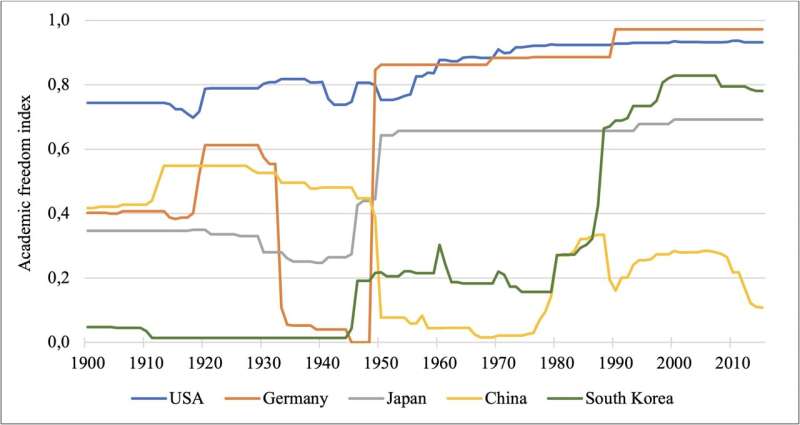This article has been reviewed according to Science X's editorial process and policies. Editors have highlighted the following attributes while ensuring the content's credibility:
fact-checked
peer-reviewed publication
trusted source
proofread
More academic freedom leads to more innovation, reports study

In many countries, scientists have experienced a loss of academic freedom in recent years. This trend has been criticized on the basis of fundamental principles. However, there has been no research to date on whether the degree of academic freedom also has an impact on a society's ability to produce innovations.
For the first time, an international team of researchers has studied the relationship between academic freedom and innovation output. As indicators for the quantity and quality of innovations, the researchers used patent applications and citations. Their analysis covered the 1900–2015 period in 157 countries.
The team used two large and respected datasets and analyzed the results: the V-Dem Dataset (Varieties of Democracy) from the V-Dem Institute at the University of Gothenburg encompasses various democracy indicators, some of which date back to 1789. They include freedom of science, which the institute, together with FAU Erlangen-Nuremberg, has also presented in the Academic Freedom Index for several years. The team obtained data on numbers of patent applications and citations from the PATSTAT database from the European Patent Office.
Their results are published in PLoS ONE.
'Alarming signs for many countries'
The study shows that more freedom for the work of scientists results in more innovations. When the degree of academic freedom improves, this is followed by increases in the numbers of patent applications and, subsequently, in the number of patent citations.
However, the situation for academic freedom declined on a global scale during the period 2011–2021 for the first time in the last 100 years. This also applies to the group of 25 countries with the strongest science base. For that decade, the research team used the results of the study to calculate the impact of the decline.
"We predict a global decline of 4%–6% in innovative capability. In the leading countries, the figure is as high as 5%–8%," says study author Paul Momtaz, Professor of Entrepreneurial Finance at TUM.
"The results are an alarming sign for many countries. Those who restrict academic freedom also limit the ability to develop new technologies and processes and therefore hinder progress and prosperity," says Momtaz. "We see this trend not only in dictatorships, but also increasingly in democratic states where populist parties have gained influence."
Numerous robustness checks confirm results
The researchers conducted several checks to confirm the robustness of the link between academic freedom and innovative output. For example, they checked whether the correlation actually results from academic freedom in particular or from general freedom in a society. They also ruled out reverse causality, in other words, the possibility of countries allowing more academic freedom when innovative output is too low.
The results of the study were also confirmed when narrowing the perspective to countries with very high or very low numbers of patent applications, when only the post-1980 period was considered or when limiting the analysis to specific aspects of academic freedom.
More information: David B. Audretsch et al, Academic freedom and innovation, PLoS ONE (2024). DOI: 10.1371/journal.pone.0304560
Journal information: PLoS ONE
Provided by Technical University Munich




















